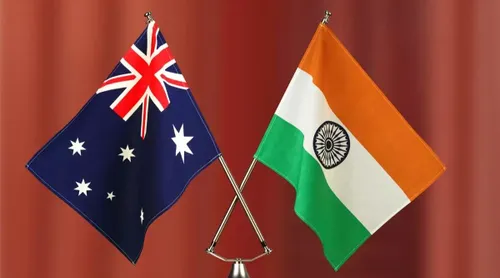Nations worldwide
In recent years, terrorism has emerged as a significant threat to global peace and security. The devastating impact of terrorist activities, ranging from loss of innocent lives to economic disruptions, underscores the urgent need for international cooperation. India and Australia, both deeply affected by terrorism, have recently called for enhanced global collaboration to combat this menace. Their unified stance highlights a growing recognition that terrorism is a global issue requiring a coordinated response from nations worldwide.
Table of Contents
The Escalating Threat of Terrorism
Terrorism poses a multifaceted challenge. It is not confined to one region or ideology, making it a complex issue that demands comprehensive strategies. The rise of extremist groups and their ability to operate across borders complicate efforts to address terrorism effectively. Recent attacks have demonstrated that no country is immune, as evidenced by the tragic events in both India and Australia.
India, having faced numerous terrorist attacks over decades, understands the grave implications of such threats. From the 2008 Mumbai attacks to various regional insurgencies, India’s experience with terrorism has been both profound and challenging. Australia, on the other hand, has also experienced the impact of terrorism, such as the 2014 Sydney siege. These events underscore the need for robust international cooperation to combat terrorism on a global scale.
The Need for Enhanced International Cooperation
India and Australia’s call for strengthened international cooperation is rooted in the recognition that terrorism transcends national borders. The interconnected nature of the modern world means that a threat in one country can quickly become a threat to others. Therefore, a collaborative approach is essential to address the root causes and manifestations of terrorism effectively.
International cooperation involves sharing intelligence, coordinating counter-terrorism operations, and implementing collective measures to disrupt terrorist networks. It also requires a unified stance in combating the financing of terrorism, as well as addressing the ideological and social factors that fuel extremist ideologies.
Key Areas for Collaborative Efforts
1. Intelligence Sharing: Effective intelligence sharing is crucial for preempting and disrupting terrorist activities. By exchanging information about terrorist plans, movements, and networks, countries can enhance their ability to prevent attacks. India and Australia, with their advanced intelligence capabilities, can lead efforts in establishing secure channels for information exchange among nations.
2. Counter-Terrorism Operations: Joint counter-terrorism operations can significantly enhance the effectiveness of global efforts. Coordinated actions in combating terrorist cells, training and equipping law enforcement agencies, and conducting joint operations can yield substantial benefits. This collaborative approach not only improves operational efficiency but also strengthens international ties in the fight against terrorism.
3. Combating Terrorist Financing: Disrupting the financial networks of terrorist organizations is vital in curbing their activities. International cooperation is essential in tracking and blocking the flow of funds to these groups. India and Australia can contribute by promoting global standards for financial transparency and supporting initiatives aimed at identifying and freezing terrorist assets.
4. Addressing Ideological Extremism: Terrorism often stems from extremist ideologies that manipulate vulnerable individuals. Collaborative efforts to counter radicalization through education, community engagement, and counter-narratives are crucial. Countries can work together to develop and share effective strategies for deradicalization and promote narratives of peace and tolerance.
5. Enhancing Border Security: Secure borders are essential in preventing the movement of terrorists and their resources. Collaborative efforts in border management, including the use of advanced technology and joint training programs, can help in strengthening border security measures.
The Role of International Organizations
International organizations play a pivotal role in facilitating and coordinating global counter-terrorism efforts. The United Nations, through its various bodies, provides a platform for member states to collaborate on counter-terrorism initiatives. India and Australia can leverage these platforms to advocate for stronger international norms and agreements related to terrorism.
Regional organizations, such as the Association of Southeast Asian Nations (ASEAN) and the South Asian Association for Regional Cooperation (SAARC), also offer avenues for regional cooperation. India and Australia’s engagement with these organizations can help in fostering regional collaboration and addressing specific regional challenges related to terrorism.
The Importance of a Unified Approach
A unified approach to combating terrorism is essential for achieving long-term success. Disparate and fragmented efforts often lead to inefficiencies and gaps in addressing the threat. By presenting a united front, countries can enhance their collective impact and demonstrate a resolute commitment to tackling terrorism.
India and Australia’s joint call for international cooperation exemplifies the importance of solidarity in addressing global challenges. Their collaborative stance reflects a shared understanding that terrorism is a common threat requiring a concerted response from the international community.
Conclusion
The call by India and Australia to strengthen international cooperation to combat terrorism underscores a crucial need in the current global landscape. As terrorism continues to evolve and adapt, the international community must respond with increased unity and collaboration. By sharing intelligence, coordinating counter-terrorism efforts, combating terrorist financing, addressing ideological extremism, and enhancing border security, nations can work together to create a safer and more secure world.
The joint efforts of countries like India and Australia serve as a model for global collaboration in addressing terrorism. Their leadership in advocating for a unified approach reflects a commitment to not only tackling the immediate threats but also addressing the underlying factors that contribute to terrorism. Through collective action and shared resolve, the international community can strive to overcome the challenges posed by terrorism and build a more peaceful world.








